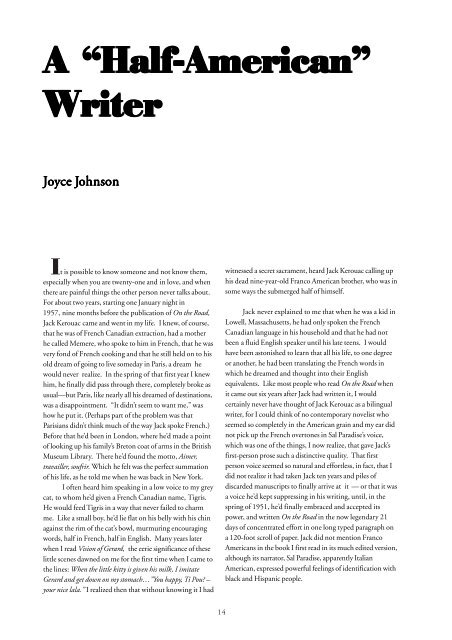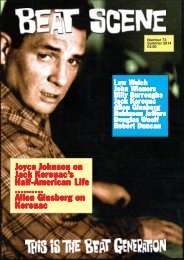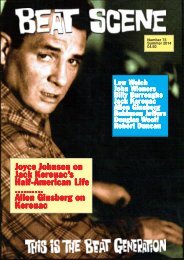Create successful ePaper yourself
Turn your PDF publications into a flip-book with our unique Google optimized e-Paper software.
A “Half-American”<br />
Writer<br />
Joyce ce Johnson<br />
I<br />
t is possible to know someone and not know them,<br />
especially when you are twenty-one and in love, and when<br />
there are painful things the other person never talks about.<br />
For about two years, starting one January night in<br />
1957, nine months before the publication of On the Road,<br />
Jack Kerouac came and went in my life. I knew, of course,<br />
that he was of French Canadian extraction, had a mother<br />
he called Memere, who spoke to him in French, that he was<br />
very fond of French cooking and that he still held on to his<br />
old dream of going to live someday in Paris, a dream he<br />
would never realize. In the spring of that first year I knew<br />
him, he finally did pass through there, completely broke as<br />
usual—but Paris, like nearly all his dreamed of destinations,<br />
was a disappointment. “It didn’t seem to want me,” was<br />
how he put it. (Perhaps part of the problem was that<br />
Parisians didn’t think much of the way Jack spoke French.)<br />
Before that he’d been in London, where he’d made a point<br />
of looking up his family’s Breton coat of arms in the British<br />
Museum Library. There he’d found the motto, Aimer,<br />
travailler, soufrir. Which he felt was the perfect summation<br />
of his life, as he told me when he was back in New York.<br />
I often heard him speaking in a low voice to my grey<br />
cat, to whom he’d given a French Canadian name, Tigris.<br />
He would feed Tigris in a way that never failed to charm<br />
me. Like a small boy, he’d lie flat on his belly with his chin<br />
against the rim of the cat’s bowl, murmuring encouraging<br />
words, half in French, half in English. Many years later<br />
when I read Vision of Gerard, the eerie significance of these<br />
little scenes dawned on me for the first time when I came to<br />
the lines: When the little kitty is given his milk, I imitate<br />
Gerard and get down on my stomach…”You happy, Ti Pou? –<br />
your nice lala.” I realized then that without knowing it I had<br />
witnessed a secret sacrament, heard Jack Kerouac calling up<br />
his dead nine-year-old Franco American brother, who was in<br />
some ways the submerged half of himself.<br />
Jack never explained to me that when he was a kid in<br />
Lowell, Massachusetts, he had only spoken the French<br />
Canadian language in his household and that he had not<br />
been a fluid English speaker until his late teens. I would<br />
have been astonished to learn that all his life, to one degree<br />
or another, he had been translating the French words in<br />
which he dreamed and thought into their English<br />
equivalents. Like most people who read On the Road when<br />
it came out six years after Jack had written it, I would<br />
certainly never have thought of Jack Kerouac as a bilingual<br />
writer, for I could think of no contemporary novelist who<br />
seemed so completely in the American grain and my ear did<br />
not pick up the French overtones in Sal Paradise’s voice,<br />
which was one of the things, I now realize, that gave Jack’s<br />
first-person prose such a distinctive quality. That first<br />
person voice seemed so natural and effortless, in fact, that I<br />
did not realize it had taken Jack ten years and piles of<br />
discarded manuscripts to finally arrive at it — or that it was<br />
a voice he’d kept suppressing in his writing, until, in the<br />
spring of 1951, he’d finally embraced and accepted its<br />
power, and written On the Road in the now legendary 21<br />
days of concentrated effort in one long typed paragraph on<br />
a 120-foot scroll of paper. Jack did not mention Franco<br />
Americans in the book I first read in its much edited version,<br />
although its narrator, Sal Paradise, apparently Italian<br />
American, expressed powerful feelings of identification with<br />
black and Hispanic people.<br />
14





